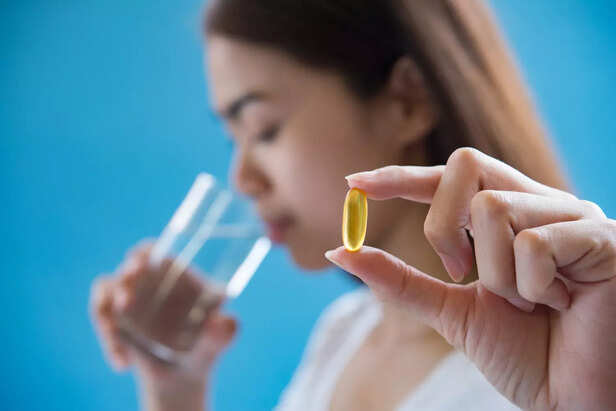Vitamin D Absorption Tips: Timing, Food, and Sunlight
Vaibhav Kochar | Oct 01, 2025, 20:49 IST
Vitamin from sunlight
( Image credit : Freepik )
Vitamin D supports bone health and immune function. Many individuals in India show low levels. Morning intake of supplements aids absorption and energy. Consume Vitamin D with fat for body utilization. Foods like eggs or ghee assist this process. Sunlight provides a way to obtain Vitamin D. Regular intake is important. Adhere to dosage to avoid health issues.
Vitamin D isn’t just another box to tick on your supplement list. It’s kind of a rockstar. Strong bones, better immunity, more energy. Despite being in a country like India, Loads of people are still running low. Why? We’re inside all the time, glued to screens, slathered in SPF 50, living off takeout. So, when’s the “magic hour” for popping your Vitamin D? Turns out, timing actually matters more than you’d think.

Most doctors and nutrition experts agree, morning is prime time for Vitamin D. First, it gives you a nice little energy push. People have actually complained about tossing and turning if they take their D too late.
Second thing: your body’s got this built-in clock, the circadian rhythm (fancy name, but it’s just your body’s way of knowing when to wake up, eat, or sleep). Morning is when your system’s revived again and ready to actually use what you throw at it. So, if you want to get the most out of your supplement, give it a shot with breakfast.

Don't simply down your Vitamin D with water and forget about it. Vitamin D is a fat-soluble vitamin, so your body requires a small amount of fat in order to actually absorb it. Eat it with your eggs, a few nuts, a tablespoon of milk, or even a fried greasy paratha with ghee.
Taking it on an empty stomach with just water? that’s not doing you any favors. The science here is super simple—fat helps Vitamin D move around in your body and actually get where it needs to go. So, moral of the story: don’t skip on the fat.

Before all these pills and supplements, people just… went outside. Fifteen, maybe twenty minutes in the morning sun, and your body automatically gets its own Vitamin D. Also, the early rays won’t fry your skin like the noon sun does.
Of course, if you’re stuck in a cubicle or live somewhere sunlight is basically a rumor, supplements are your safety net. But honestly, there’s something about standing in the sun that just hits different, boosts your mood, melts away stress, all that good stuff. Nature’s pharmacy, and it won’t even charge you.
Vitamin D is not just another boring supplement; it is your body's own personal sunrise. It keeps you strong, sharp, and less likely to get sick.
And don’t get wild with the dosage, either. More isn’t always better. Having too much Vitamin D can cause problems, nausea, feeling wiped out, or worse yet, kidney issues. Just stick to what your physician says and use it like brushing your teeth, boring, but something you have to do.
Take it or leave it, but don't complain when your tired and creaking joints come back to bite you. Vitamin D: your bottled sunshine, daily supply. Don't sleep on it. Just take it when you wake.
Explore the latest trends and tips in Health & Fitness, Travel, Life Hacks, Fashion & Beauty, and Relationships at Times Life!
Take It in the Morning

Vitamin D sources
( Image credit : Freepik )
Most doctors and nutrition experts agree, morning is prime time for Vitamin D. First, it gives you a nice little energy push. People have actually complained about tossing and turning if they take their D too late.
Second thing: your body’s got this built-in clock, the circadian rhythm (fancy name, but it’s just your body’s way of knowing when to wake up, eat, or sleep). Morning is when your system’s revived again and ready to actually use what you throw at it. So, if you want to get the most out of your supplement, give it a shot with breakfast.
Don’t Just Swallow and Go

Vitamin D supplement
( Image credit : Freepik )
Don't simply down your Vitamin D with water and forget about it. Vitamin D is a fat-soluble vitamin, so your body requires a small amount of fat in order to actually absorb it. Eat it with your eggs, a few nuts, a tablespoon of milk, or even a fried greasy paratha with ghee.
Taking it on an empty stomach with just water? that’s not doing you any favors. The science here is super simple—fat helps Vitamin D move around in your body and actually get where it needs to go. So, moral of the story: don’t skip on the fat.
Sunlight: The OG Source

Sunlight and vitamin d
( Image credit : Freepik )
Before all these pills and supplements, people just… went outside. Fifteen, maybe twenty minutes in the morning sun, and your body automatically gets its own Vitamin D. Also, the early rays won’t fry your skin like the noon sun does.
Of course, if you’re stuck in a cubicle or live somewhere sunlight is basically a rumor, supplements are your safety net. But honestly, there’s something about standing in the sun that just hits different, boosts your mood, melts away stress, all that good stuff. Nature’s pharmacy, and it won’t even charge you.
Don’t Overthink It, Just Be Consistent
And don’t get wild with the dosage, either. More isn’t always better. Having too much Vitamin D can cause problems, nausea, feeling wiped out, or worse yet, kidney issues. Just stick to what your physician says and use it like brushing your teeth, boring, but something you have to do.
Take it or leave it, but don't complain when your tired and creaking joints come back to bite you. Vitamin D: your bottled sunshine, daily supply. Don't sleep on it. Just take it when you wake.
Explore the latest trends and tips in Health & Fitness, Travel, Life Hacks, Fashion & Beauty, and Relationships at Times Life!
Frequently asked Questions (FAQs)
- Can I take vitamin D with other supplements?
Yes, it pairs well with calcium or magnesium, but avoid taking with high-dose iron. - Does the season affect the need for vitamin D supplements?
Yes, in winters or cloudy regions, supplements are more essential. - Is it okay to take vitamin D on an empty stomach?
Not ideal, as it absorbs better with meals containing healthy fats. - Can vitamin D help with mood swings or seasonal depression?
Yes, research shows it supports mental health and reduces winter blues.
